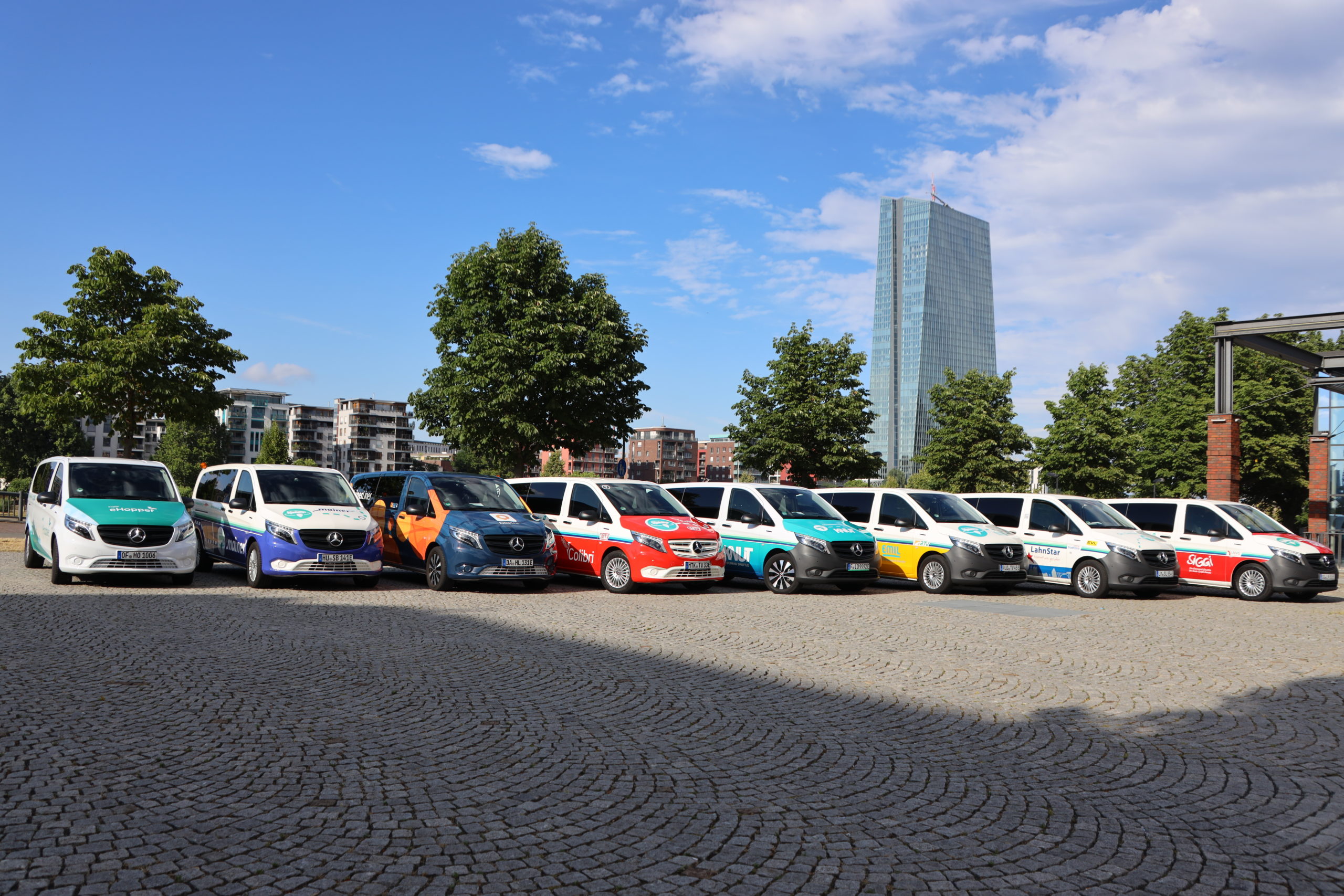Die Preisträgerinnen und Preisträger 2022
DMP | Good Practice
On-Demand-Mobilität für die Region Frankfurt/RheinMain: Verkehr auf Abruf für die erste und letzte Meile
On-Demand-Mobilität für die Region Frankfurt/RheinMain: Verkehr auf Abruf für die erste und letzte Meile
Einfach, komfortabel und umweltfreundlich – „On-Demand-Mobilität für die Region Frankfurt/RheinMain“ verbindet den klassischen ÖPNV mit Angeboten der digital getriebenen, neuen Mobilität und schafft für den Fahrgast und die Fahrgästin so einen echten Mehrwert: Angebotslücken im ÖPNV werden mit emissionsfreien Fahrzeugen geschlossen und eine nachhaltigere Mobilität ermöglicht. Bis zu 1,8 Millionen Menschen in der Metropolregion erhalten so eine umweltfreundliche und digitale Ergänzung des ÖPNV auf der ersten und letzten Meile. Das Projekt ermöglicht einen attraktiven, digitalen ÖPNV in suburbanen und ländlichen Gebieten und reduziert damit die NO2-Produktion.
Ort: Hofheim am Taunus, Hessen
Projekt Webseite Link falls vorhandenDMP | Erfahrungstransfer
Netzwerk der vom Land geförderten Stellen für nachhaltige Mobilität in Baden-Württemberg
Netzwerk der vom Land geförderten Stellen für nachhaltige Mobilität in Baden-Württemberg
Um die Verkehrswende in Baden-Württemberg durch Mobilitätsprojekte nachhaltig voranzutreiben und umzusetzen, fördert das Verkehrsministerium Personalstellen in verschiedenen Bereichen der nachhaltigen Mobilität. Die aktuell 112 geförderten Stellen werden themenspezifisch koordiniert und vernetzt. Die neuen Mobilitätsexpertinnen und Mobilitätsexperten haben dabei eine zentrale Rolle bei der Projektkoordination und Maßnahmenumsetzung für nachhaltige Mobilität, Digitalisierung und Klimaschutz im Verkehr. Sie stellen eine Brückenfunktion zwischen Land und Kommunen dar, um die Landesziele zu transportieren und umzusetzen. Das landesweite Netzwerk ermöglicht so eine unkomplizierte Vernetzung und den Wissenstransfer zwischen den Stellen, um die Verkehrswende und Mobilität der Zukunft, effektiv voranzutreiben.
Ort: Stuttgart, Baden-Württemberg
Projekt Webseite Link falls vorhandenDMP | Veränderung
eFarm: Wasserstoff aus Nordfriesland
eFarm: Wasserstoff aus Nordfriesland
Pragmatisch, nordisch, grün: Im Kreis Nordfriesland sitzt das von GP JOULE initiierte Verbundprojekt eFarm. Das größte nachhaltige Wasserstoff-Mobilitätsprojekt in Deutschland setzt auf regenerativ erzeugten, grünen Wasserstoff. Die Prinzipien dahinter stammen aus der Landwirtschaft: Vielfalt statt Monokultur, optimale Synergie statt optimaler Einzelnutzen und vor allem ganzheitliches Denken: Erzeugung, Vertrieb und Nutzung werden zusammengedacht. Aus überschüssigem Windstrom wird in fünf Elektrolyseuren Wasserstoff erzeugt. Mit zwei Tankstellen werden initiativ zwei Brennstoffzellen-Linienbusse und 30 PKWs versorgt. Über die 20 Gesellschafter sind rund 3.000 Menschen am Projekt beteiligt. eFarm zeigt: Gemeinschaftliches, nachhaltiges Wirtschaften ist möglich und der emissionsfreie Nahverkehr kommt allen zugute – Menschen und Umwelt.
Ort: Reußenköge, Schleswig-Holstein
Projekt Webseite Link falls vorhandene.Volution: Das Pendel-Shuttle-System
e.Volution: Das Pendel-Shuttle-System
e.Volution ist ein Shuttle-System für Berufspendlerinnen und -pendler, um den PKW-Verkehr zu Stoßzeiten zu reduzieren. Arbeitgeberinnen und Arbeitgeber können es ihren Mitarbeitenden für kostenfreie Fahrten zur Verfügung zu stellen. Das Corporate Shuttle bündelt den Pendlerverkehr und spart so Platz, Energie und C02 ein, bietet den Menschen aber gleichzeitig ein individualisiertes, komfortables und flexibles Fahrerlebnis. Wenn es gelingt, in den bis zu sieben Personen fassenden Shuttles im Durchschnitt fünf Personen zur Arbeit zu befördern, spart das System fünf Privat-PKWs ein und damit 80% Platz auf den Straßen und 25% C02-Ausstoß.
Das Shuttle META ist ein barrierefreies elektrisches Circular-Economy-Fahrzeug, das mit dem Ziel einer extrem ressourcenschonenden Produktion und einer besonders langen Nutzungsdauer entwickelt wurde. In der Startphase kooperiert e.Volution mit der Telekom am Standort Bonn, mit der Städteregion Aachen am Standort Merzbrück, mit dem Kreis Coesfeld im Münsterland und mit der Stadt Bochum am Standort Mark 51°7 (ehem. Opel-Werk).Ort: Aachen, Nordrhein-Westfalen
Projekt Webseite Link falls vorhandenDMP | Daten und Innovationen
OPENER next: Nächster Halt: Barrierefreiheit!
OPENER next: Nächster Halt: Barrierefreiheit!
Die Vision von OPENER next ist es, den Öffentlichen Personennahverkehr (ÖPNV) attraktiver zu gestalten. Ziel ist einerseits die Förderung einer inklusiven Gesellschaft und andererseits das Vorantreiben einer nachhaltigen Mobilitätswende.
Der Ansatz des Projektes basiert dabei auf einem gesellschaftlichen Füreinander, was bedeutet, dass Bürgerinnen und Bürger dazu beitragen können, Haltestellen und deren Eigenschaften mittels einer App zur Datenerhebung (OpenStop) zu erfassen und aktuell zu halten. Das Besondere dabei ist, dass nicht nur der Erfassungsaufwand auf mehrere Schultern verteilt wird, sondern auch dass die Erfassung kontinuierlich und bedarfsgerecht stattfindet. Ganz im Sinne eines Füreinanders sind die erfassten Daten für jeden frei verfügbar. Mit dem Projekt sollen mehr Menschen dazu bewegt werden, noch öfter auf Bus und Bahn umzusteigen.
Ort: Chemnitz, Sachsen
Projekt Webseite Link falls vorhandenDMP | International
VelObserver: Subjektive Erfassung der Qualität der Fahrradinfrastruktur
VelObserver: Subjektive Erfassung der Qualität der Fahrradinfrastruktur
In den meisten Städten fehlt eine Infrastruktur, die das Fahrradfahren zu einem angenehmen und komfortablen Verkehrserlebnis macht. Um das nachhaltige Verkehrsmittel zukunftsorientiert zu fördern, ist es notwendig, den Fokus des Infrastrukturbaus konsequent auf die gefühlte und subjektive Sicherheit zu legen. Genau hierzu gab es allerdings bisher keinerlei Daten. Das Projekt VelObserver erfasst diese Daten deshalb in einem einzigartigen Ansatz flächendeckend und im Crowdsourcing in der Stadt Zürich. Fahrradfahrende geben ihre Meinung zum persönlichen Gefühl für verschiedene Segmente ab. So wurden in den letzten Monaten über 40.000 Bewertungen erfasst, die ebenso Fortschritte sichtbar machen und der Stadt Zürich als Planungsgrundlage für die Weiterentwicklung des Fahrradnetzes dienen.
Ort: Zürich, Schweiz
Projekt Webseite Link falls vorhandenDMP | Young Vision
Second Ride: Elektrifiziere Dein Moped
Second Ride: Elektrifiziere Dein Moped
Second Ride bietet einen Umbausatz, mit denen Verbrenner-Mopeds der Kult-Marke Simson auf einen E-Motor umgerüstet werden können. Dabei wird nur der Antriebsstrang ausgewechselt, Struktur- und Karosserieteile sowie Innenausstattung werden nach dem Prinzip der Circular Economy weiter verwendet. Durch die Umrüstung wird Elektromobilität ökologisch, ökonomisch sowie sozial nachhaltiger möglich. Mitgründer und Ideengeber Carlo Schmid verantwortet die technische Entwicklung und hat den Umbausatz zur TÜV-Zertifizierung und Straßenzulassung geführt.
Ort: Berlin-Neukölln, Berlin
Projekt Webseite Link falls vorhandenDMP | Science Fiction
Veloroute H2O: Der schwimmende Radweg
Veloroute H2O: Der schwimmende Radweg
Die Veloroute H2O ist eine Konzeption für ein Fährsystem für Fahrräder, das die beiden Seiten der Kieler Innenstadt miteinander verbindet. Entwickelt wurde sie von Bashar Zapen, der Student an der Muthesius Kunsthochschule ist. Eine elektrische, autonome Fähre transportiert Fahrradfahrende, angetrieben von Wind- und Gezeitenturbinen, über die Kieler Förde. Der schwimmende Radweg ergänzt das Radwegenetzwerk Kiels, so dass Kielerinnen und Kieler für die Überquerung der Förde nicht mehr auf Umwege mittels ÖPNV oder Privatfahrzeug angewiesen sind.
Ort: Kiel, Schleswig-Holstein
Projekt Webseite Link falls vorhandenDMP | Art
Parasite Parking: Intervention im öffentlichen Raum
Parasite Parking: Intervention im öffentlichen Raum
Das Projekt Parasite Parking ist eine Intervention im öffentlichen Raum: Die als Parkplatz getarnte multifunktionale Plattform – der Parasit – kann sich jederzeit verwandeln und sich der Umgebung sowie Nutzung flexibel anpassen. Die Plattform ist ein ungeladener Gast auf den Flächen, die allen als Teil der Gesellschaft zur Verfügung stehen und doch meist nur von stählernen Karosserien der Moderne besetzt werden. Parasite Parking de- und recodiert öffentlichen Raum. Der Parasit fragt dabei nicht nach Eigentum und dessen Regeln, sondern nach den Grenzen der Nutzbarmachung von öffentlichem Raum und dessen Formeln mobiler und flexibler Nutzungsformen. Er kommt und geht, je nachdem, wie lange er eine Nische bewohnen kann.
Ort: Reinickendorf, Berlin
Projekt Webseite Link falls vorhandenDMP | Menschen
Katja Diehl
Katja Diehl
Katja Diehl hat sich über ihre gesamte berufliche Laufbahn hinweg Expertise zu Nachhaltigkeit mit dem Schwerpunkt Mobilität der Zukunft angeeignet. Das Mantra ihrer Arbeit lautet: „Jede und Jeder sollte das Recht haben, ein Leben ohne eigenes Auto führen zu können.“ Dazu schreibt sie einen Blog, betreibt den Podcast »SheDrivesMobility« und ist auf den sozialen Medien sowie auf der Bühne unterwegs. Darüber hinaus engagiert sie sich im Bundesvorstand des Verkehrsclub Deutschland e. V., in der Hamburger Vertretung von womeninmobility und als Beirätin der österreichischen Klimaschutzministerin. 2022 ist ihr Buch »Autokorrektur. Mobilität für eine lebenswerte Welt« erschienen. Ihre Kernkompetenz ist es kommunikativ die Dinge auf den Kopf zu stellen – zugunsten einer menschenzentrierten Verkehrswende.
Katja Diehls Vision für die Zukunft ist eine kinderfreundliche, klimafreundliche, barrierearme, entschleunigte Mobilität, die auf Gleichberechtigung abzielt. Privilegien für Autos sollten zurückgeschraubt werden und Parkplätze und Straßen vor allem auch für Radfahrerinnen und Radfahrer sowie Fußgängerinnen und Fußgänger gestaltet werden. Als größte Herausforderung der Verkehrswende sieht sie eine Einstellungs- und Verhaltensänderung.
DMP | Audience Award
Katja Diehl
Katja Diehl
Katja Diehl hat sich über ihre gesamte berufliche Laufbahn hinweg Expertise zu Nachhaltigkeit mit dem Schwerpunkt Mobilität der Zukunft angeeignet. Das Mantra ihrer Arbeit lautet: „Jede und Jeder sollte das Recht haben, ein Leben ohne eigenes Auto führen zu können.“ Dazu schreibt sie einen Blog, betreibt den Podcast »SheDrivesMobility« und ist auf den sozialen Medien sowie auf der Bühne unterwegs. Darüber hinaus engagiert sie sich im Bundesvorstand des Verkehrsclub Deutschland e. V., in der Hamburger Vertretung von womeninmobility und als Beirätin der österreichischen Klimaschutzministerin. 2022 ist ihr Buch »Autokorrektur. Mobilität für eine lebenswerte Welt« erschienen. Ihre Kernkompetenz ist es kommunikativ die Dinge auf den Kopf zu stellen – zugunsten einer menschenzentrierten Verkehrswende.
Katja Diehls Vision für die Zukunft ist eine kinderfreundliche, klimafreundliche, barrierearme, entschleunigte Mobilität, die auf Gleichberechtigung abzielt. Privilegien für Autos sollten zurückgeschraubt werden und Parkplätze und Straßen vor allem auch für Radfahrerinnen und Radfahrer sowie Fußgängerinnen und Fußgänger gestaltet werden. Als größte Herausforderung der Verkehrswende sieht sie eine Einstellungs- und Verhaltensänderung.
Bisherige Preisträgerinnen und Preisträger finden Sie hier. Der Deutsche Mobilitätspreis wurde bis einschließlich 2021 in einer anderen Konstellation durchgeführt.













